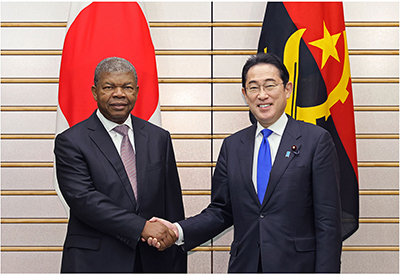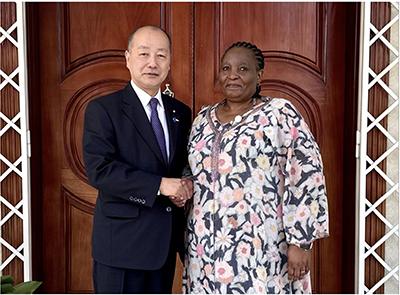Diplomatic Bluebook 2024
Chapter 2
Resilient and Unwavering Regional Diplomacy
3 Southern Africa
(1) Angola
Angola has a stable political foundation and plays an important role in regional peace and stability through active multilateral diplomacy. It is one of the leading oil-producing countries in Africa and is rich in mineral resources such as diamonds. President João Manuel Gonçalves Lourenço is actively working to improve the business environment and promote domestic industry to diversify and stabilize the economy.
In March, President Lourenço made an official working visit to Japan and attended the Japan-Angola Business Forum. During his meeting with Prime Minister Kishida, the two leaders discussed strengthening business relations and Russia's aggression against Ukraine and affirmed the importance of transparent and fair development finance. During his visit to Angola in August, Minister of Economy, Trade and Industry, NISHIMURA Yasutoshi, signed the Japan-Angola Investment Agreement and attended the Japan-Angola Business Roundtable.
 Japan-Angola Summit Meeting (March 13, Tokyo, Photo: Cabinet Public Affairs Office)
Japan-Angola Summit Meeting (March 13, Tokyo, Photo: Cabinet Public Affairs Office)(2) Eswatini
Eswatini maintains the only absolute monarchy in Africa under King Mswati III.
In April 2018, the country changed its name from the “Kingdom of Swaziland” to the “Kingdom of Eswatini.” It is the only country in Africa that has diplomatic relations with Taiwan. In February, Parliamentary Vice-Minister for Foreign Affairs TAKAGI Kei met with Minister of Foreign Affairs and International Cooperation Thulisile Dladla during his visit to Ethiopia. Parliamentary elections were held in October and the King appointed a new prime minister and cabinet members.
 Parliamentary Vice-Minister for Foreign Affairs Takagi meeting with Minister of Foreign Affairs and International Cooperation Thulisile Dladla of Eswatini (February 16, Addis Ababa, Ethiopia)
Parliamentary Vice-Minister for Foreign Affairs Takagi meeting with Minister of Foreign Affairs and International Cooperation Thulisile Dladla of Eswatini (February 16, Addis Ababa, Ethiopia)(3) Zambia
Zambia, which has abundant mineral resources including copper, defaulted on its debts in November 2020, but in June 2023, it reached a general agreement on a debt restructuring plan with a committee of official creditors under the common G20 framework. Its domestic politics remains stable, and the country is strengthening its ties with Western countries, including co-hosting the second Summit for Democracy with the U.S. as Africa's representative in March. In July, Vice-Minister for Foreign Affairs of Japan and high officials of Zambia exchanged views, and Minister of Economy, Trade and Industry Nishimura visited the country in August and paid a courtesy call on President Hakainde Hichilema.
(4) Zimbabwe
In August, Zimbabwe held general elections, including a presidential election, for the first time in five years. Japan provided election-related equipment and training through a grant assistance program called the Election Assistance Program (UNDP partnership), thereby contributing to the consolidation of democracy and the rule of law in the country. Incumbent President Emmerson Mnangagwa was re-elected, and a new cabinet was formed, but some international election observers, including the European Union, have expressed concern about the fairness of the election. The U.S. and Europe continue to impose sanctions, including asset freezes and travel bans on certain companies and individuals. The new government faces challenges in managing the economy, including dealing with prolonged inflation and excess debt.
(5) Namibia
Namibia has been politically stable since its independence in 1990. It is an important logistics hub on the Atlantic side of the Southern African region with abundant marine and mineral resources. It also ranked first in Africa in the 2023 World Press Freedom Index. In April, Minister of Mines and Energy Tom Alweendo visited Japan. In June, a Japanese business mission visited Namibia. In August, Minister of Economy, Trade, and Industry Nishimura became the first Japanese cabinet minister to visit Namibia, where he affirmed that Japan would further strengthen and develop bilateral relations.
(6) Botswana
Botswana has been politically stable since gaining independence in 1966. Economically, the country has grown rapidly since independence thanks to revenues from diamonds and other minerals and is now classified as an upper-middle-income country. Meanwhile, President Mokgweetsi Masisi is aiming to transition to a knowledge-intensive economy with diversified industries. In February, Japan and Botswana signed an exchange of notes for the Emergency Support Project in Response to the COVID-19 Crisis, which will provide financial support towards economic and social stabilization and the transition to a green economy.
(7) Malawi
Malawi has maintained stable domestic affairs since its independence in 1964. However, in recent years, the economy has become unstable due to floods and foreign currency shortages. The country is currently working on disaster recovery, fiscal reconstruction, and agricultural industrialization. Japan has built friendly relations with Malawi, with which it shares fundamental values, and provided emergency relief goods through JICA in response to the flood and landslide damage caused by Cyclone Freddy, which struck the southern part of the country in March.
(8) South Africa
South Africa has demonstrated its presence in the international arena through its participation in the G20 and BRICS, and through the efforts of African leaders in the Ukraine peace initiative. It is also a major economic power in Africa and continues to attract interest from foreign companies, including Japanese, as a base for expanding business operations. In June, Foreign Minister Hayashi held a telephone call with Naledi Pandor, Minister of International Relations and Cooperation. In August, he visited South Africa and held a foreign ministers' meeting in which the two countries affirmed to strengthen bilateral relations and cooperate in the international arena. In the energy and mining sector, State Minister for Foreign Affairs Yamada visited the country in February to participate in the Mineral Security Partnership. In September, upon Minister of Higher Education and Training Bonginkosi Emmanuel Nzimande's visit to Japan, the two governments concluded a memorandum of cooperation on matters related to hydrogen and ammonia.
 Japan-South Africa Foreign Ministers' Meeting (August 1, Pretoria, South Africa)
Japan-South Africa Foreign Ministers' Meeting (August 1, Pretoria, South Africa)(9) Mozambique
Mozambique is an important partner for FOIP and has been a non-permanent member of the UN Security Council with Japan since 2023.
In May, Prime Minister Kishida visited Mozambique with the Public and Private Sector Joint Mission for Promoting Trade and Investment in Africa, led by State Minister for Foreign Affairs Yamada, and held a summit meeting with President Filipe Jacinto Nyusi. The two governments agreed to provide strong support for the early resumption of the liquefied natural gas development project in the north of the country. In October, Parliamentary Vice-Minister for Foreign Affairs HOSAKA Yasushi visited the country to attend the inauguration ceremony for the Nacala Port project, which Japan provided support for through yen loans, and paid a courtesy call on President Nyusi. In November, Foreign Minister Kamikawa met with Minister of Foreign Affairs and Cooperation Verónica Nataniel Macamo Dlhovo, who was visiting Japan, and confirmed the importance of multifaceted development that will lead to growth in the entire northern region of the country, including using the Co-creation for Common Agenda Initiative, as well as the promotion of issues such as “Women, Peace and Security (WPS)”.
(10) Lesotho
In Lesotho, a landlocked country composed of mostly mountainous highlands, trout aquaculture is conducted in the lake of the Katse Dam constructed by utilizing natural resources, providing a major export product to Japan. In addition to improving the food situation through food aid, Japan is also supporting the improvement of the country's energy supply by upgrading the Katse Dam's small hydroelectric power generation facilities and increasing the country's power generation capacity through renewable energy.
